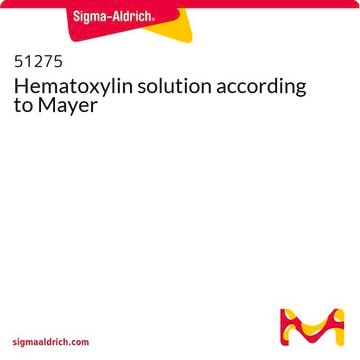Recommended Products
form
solution
shelf life
Expiry date on the label.
IVD
for in vitro diagnostic use
concentration
4 g/L
technique(s)
microbe id | staining: suitable
pH
2.5-3.5
application(s)
hematology
histology
storage temp.
room temp
Looking for similar products? Visit Product Comparison Guide
Application
Other Notes
Signal Word
Danger
Hazard Statements
Precautionary Statements
Hazard Classifications
Eye Dam. 1
Storage Class Code
10 - Combustible liquids
WGK
WGK 3
Flash Point(F)
Not applicable
Flash Point(C)
Not applicable
Certificates of Analysis (COA)
Search for Certificates of Analysis (COA) by entering the products Lot/Batch Number. Lot and Batch Numbers can be found on a product’s label following the words ‘Lot’ or ‘Batch’.
Already Own This Product?
Find documentation for the products that you have recently purchased in the Document Library.
Customers Also Viewed
Related Content
Brief information on the field of cytology, its role in cytodiagnosis and the use of standard and special stains for microscopic analysis to detect cellular abnormalities.
Brief information on the field of cytology, its role in cytodiagnosis and the use of standard and special stains for microscopic analysis to detect cellular abnormalities.
Brief information on the field of cytology, its role in cytodiagnosis and the use of standard and special stains for microscopic analysis to detect cellular abnormalities.
Brief information on the field of cytology, its role in cytodiagnosis and the use of standard and special stains for microscopic analysis to detect cellular abnormalities.
Our team of scientists has experience in all areas of research including Life Science, Material Science, Chemical Synthesis, Chromatography, Analytical and many others.
Contact Technical Service










